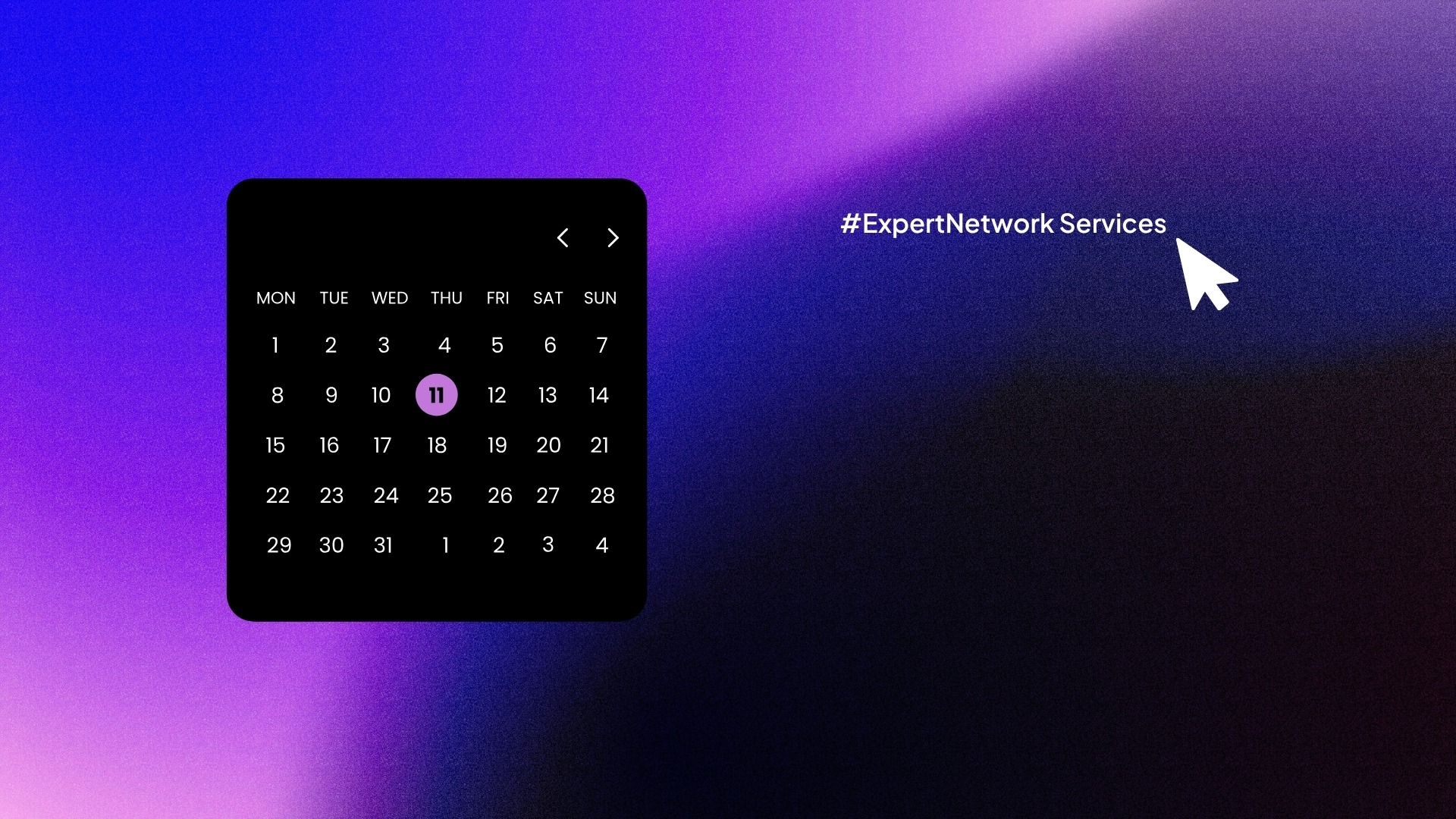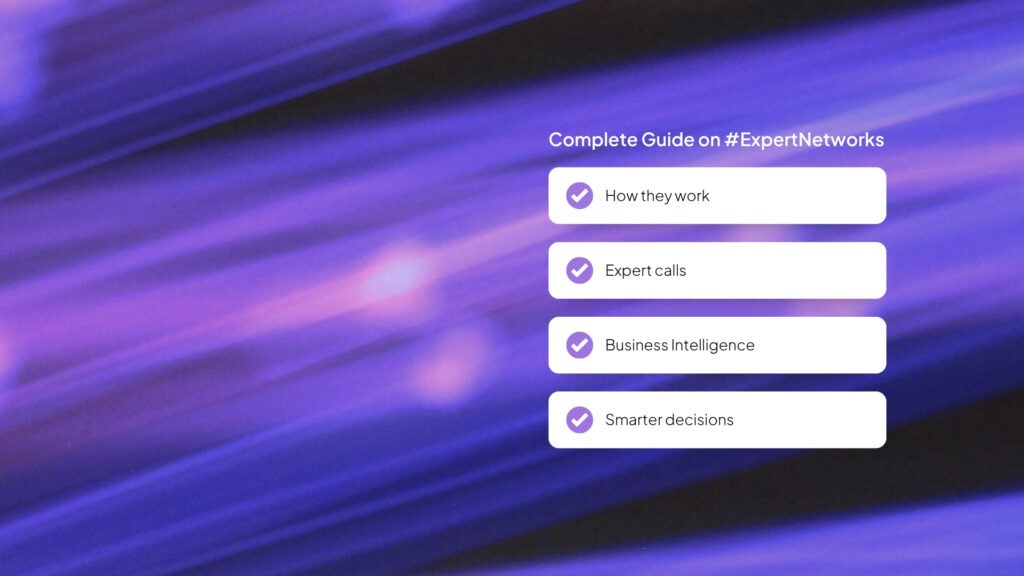Learn more in our complete Expert Network Guide, covering the industry’s evolution, top providers, and how expert network services deliver ROI.
Today’s expert network landscape includes major players such as Guidepoint, AlphaSights, Dialectica, and GLG, as well as new emergent players like Infoquest, each offering distinct approaches to sourcing and managing expertise.
Choosing the right expert network service can dramatically improve both insight quality and return on investment. Therefore, before engaging, organizations should understand the differences between expert calls, surveys, and custom-sourcing models, other services, and how to maximize ROI from each.
Types of Expert Network Services
Expert network services today go far beyond traditional one-on-one phone consultations. Modern networks offer a wide range of solutions designed to help organizations access the right expertise in the right format, from one-on-one discussions to full project delivery. Below are the six core expert network service types that drive the most value.

1. Expert Calls
These remain the foundation of expert network services. Clients connect directly with subject-matter experts for insight-rich discussions, which are ideal for validating assumptions, assessing markets, or stress-testing strategies. These expert calls deliver fast, actionable clarity when timing and precision matter most.
2. On-Demand Subject Experts
Beyond single calls, some organizations integrate on-demand experts directly into their teams. This model works well for consulting firms or corporates managing complex projects where specialized expertise is needed for days or weeks, not an hour or so. It’s a flexible, scalable alternative to traditional staffing or contracting.
3. Surveys
Surveys help businesses test hypotheses and validate insights across large respondent pools. Expert network platforms leverage verified professional databases to run targeted surveys, giving clients quantitative insights in record time. This service is especially effective for market sizing, pricing analysis, and trend tracking.
4. Consultant-Led Projects
In this model, these networks connect clients with consultants who don’t just advise but also deliver. These experts help structure market analyses, prepare investment theses, or validate strategies, often working alongside internal teams. It combines the precision of custom-sourced expertise with the output quality of a boutique consultancy.
5. Written Reports
Written outputs allow organizations to gain structured, ready-to-use intelligence without conducting multiple calls. Expert-written reports clarify complex findings into concise insights, saving time and extending internal research capacity. These are particularly valuable for investors, strategy teams, and corporates needing quick knowledge transfer.
6. Keynote Speakers
Some expert network services specialize in connecting clients with thought leaders and executives for events, board meetings, and knowledge sessions. These engagements provide high-level strategic context and elevate corporate learning or client engagement initiatives.
Explore Infoquest’s Services
Send Your Project BriefWhen and Why to Use Each Expert Network Service Type
Choosing the right service depends on your research goal, timeline, and budget. Each service type suits a specific business scenario, from rapid intelligence gathering to strategic project execution.
Expert Calls
Expert one-on-one calls remain the fastest and most effective way to gain deep, topic-specific knowledge.
During the Silicon Valley Bank collapse, for example, investment managers relied on expert calls to access immediate insights from banking professionals within hours of the news. Similarly, private equity firms use these calls throughout their investment lifecycle, from identifying opportunities to validating deals.
Recent data shows that strategy development has now overtaken due diligence as the top use case for expert calls. In one survey, 87 respondents used expert networks for strategy cases, compared to 72 for due diligence, with another 57 planning to increase their use for strategy projects. Other rising applications include proposal support (42), internal research (25), and transformation programs (23).
Surveys
Surveys provide quantitative data from a broad set of verified professionals. They’re ideal for market sizing, pricing analysis, message testing, and product development.
For instance, a medical device manufacturer can use expert surveys to assess how much buyers are willing to pay for a new product under different pricing conditions, which turns collective insight into actionable data.
Custom-Sourcing and Follow-Up Calls
Custom-sourced experts and follow-up consultations extend the impact of other research methods. They help dig deeper into findings from surveys or initial interviews.
For example, networks may re-engage survey participants for short follow-up calls, uncovering the nuanced reasoning behind their responses. This combination of quantitative and qualitative input leads to sharper insights and more confident decisions.
Maximizing ROI from Expert Network Engagements
Maximizing return on investment (ROI) from expert network services requires clear planning, efficient execution, and continuous optimization. Companies that manage their expert engagements strategically can cut costs by 50–70% compared to consulting firms or full-time hires. They also boost efficiency, often reducing research time by 40–60%.

Define Clear Project Objectives
The first step to improving ROI is clarity. Organizations should start by defining precise project goals before reaching out to an expert network. This ensures the right experts are selected, avoids redundant consultations (bad calls), and keeps budgets under control.
Understand Pricing Models
Pricing structures play a major role in overall ROI. Most expert networks offer a mix of hourly, project-based, credit-based, and subscription models.
- Credit-Based: Each expert call consumes one credit (typically one hour).
- Pay-As-You-Go: Pay per interaction, ideal for smaller or irregular projects.
- Subscription Plans: Provide ongoing access under fair-usage policies.
- At-Cost Models: Offer lower rates in exchange for shared transcript access with other investors [11].
Selecting the right model aligns spend with research volume and urgency, directly improving efficiency and ROI.
Leverage Multiple Networks and Technology
Using multiple expert networks increases access to niche professionals and reduces dependency on any single provider. Data shows that 54% of consultants now work with two to four networks, while 42% rely on just one.
Monitor and Optimize Spending
Expert network engagements should be tracked like any other strategic investment. Regularly review spend, call quality, and outcome value to identify inefficiencies or missed insights.
Ensure Compliance for Sustainable ROI
Strong ROI depends on responsible governance. Every expert network service should have a dedicated compliance team that maintains consultation records and ensures experts regularly confirm confidentiality and ethical standards. Robust compliance not only mitigates legal risk but also protects long-term value creation across engagements.
Infoquest’s ROI Advantage
Infoquest maximizes ROI through a custom-sourcing model designed around speed, precision, and fit, not database size. Each engagement begins with a detailed scoping process, after which the sourcing team identifies, screens, and delivers vetted experts within hours, often cutting project turnaround times by up to 60%.
By focusing on expert quality over volume, Infoquest reduces wasted consultations, lowers cost per relevant expert, and improves decision accuracy. Whether clients need a one-hour consultation, a 50-responder survey, or a consultant-led validation project, Infoquest’s hybrid sourcing model ensures every dollar spent yields measurable results.

In short:
- Best ROI for fast, strategic insights: Custom-Sourced Expert Calls
- Best ROI for quantitative validation: Expert Surveys
- Best ROI for operational depth: On-Demand Experts & Consultant-Led Projects
- Best ROI for knowledge leverage: Written Reports & Transcripts
ROI isn’t about choosing the cheapest option; it’s about aligning the right expert network service with the right need. Infoquest’s custom-sourcing-first model ensures that alignment every time.
Conclusion
Companies that set clear goals, pick the right service type, and manage costs wisely can leverage the best out of expert networks. Compliance remains key; the best networks maintain strict oversight and verified experts.
Infoquest leads this new standard. Its custom-sourcing model connects clients with verified experts in hours, combining speed, precision, and measurable ROI.
FAQs
Q1. What are the main expert network service types?
Expert calls, B2B surveys, transcript libraries, custom-sourcing, and AI-powered matching.
Q2. How can companies maximize ROI?
Define goals, understand pricing, use multiple networks, leverage AI tools, and track spending.
Q3. How have use cases evolved?
Expert networks now support strategy, transformation, and proposal work, not just due diligence.
Q4. What compliance factors matter most?
Select networks with robust compliance teams, verified experts, and detailed consultation records.

